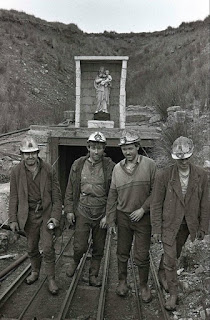Before Muintir na Tíre was founded in 1937 by Canon John
Hayes, he established a co-operative society, Muintir na Tíre Limited, in 1931.
Muintir na Tíre was an agricultural producers co-operative society for farmers
and their labourers.
I have discovered some records relating to Muintir na Tíre Limited
during the appraisal and arranging of the Muintir na Tíre archive. This includes
the minute books from 1931 – 1937 and some published material.
The minute books of Muintir na Tíre Limited note how Muintir
na Tíre Limited was set up, the rules that should be followed, the prices of
shares and the title of the organisation. They note the various meetings of the
organisation during the years it was active and those who were involved in the
organisation.
The first entry in the first minute book is a circular announcing a meeting on March 4th 1931
“to further consider the matter of setting up an organisation which will
embrace every section of Irish Agriculture and avoid political affiliation”
announced the intention of setting up an organisation which would act as a
parent organisation for all those involved in agriculture. It was decided at
this meeting to set up such an organisation, and this became known as Muintir
na Tíre Limited.
It was agreed that the association would be registered as a
limited liability organisation under the Industrial and Provident Societies
Act. Muintir na Tíre Limited was registered with the Register of Friendly
Societies on 24th November 1931. To be registered with the Register
of Friendly Societies Muintir na Tíre Limited had to produce rules.
Muintir na Tíre Limited believed in rural self-help. The
ideological basis for Muintir na Tíre Limited was the encyclical Rerum Novarum.
In this the Pope was calling for greater harmony between the social classes. In
Ireland this was seen as the relationship between farmer and labourer. This
vision was set out by Reverend Hayes in an address to a meeting of delegates at
Commercial Buildings Dublin, 7th May 1931 and published in the below
booklet.
Muintir na Tíre Limited agreed the formation of branches in
1934. Rules and regulations governing the formation of branches were
established.
The most successful activity of Muintir na Tíre Limited was
the development of Rural Weekends. These weekends were a shortened version of
Semaine Sociales held in rural France. Rural weekends developed into the Rural
Weeks run by Muintir na Tíre.
Muintir na Tíre Limited was a precursor to Muintir na Tíre and
many of the ideas of Canon Hayes were developed and tried out in the
co-operative society. However, the co-operative was found to be too limiting and
by 1937 it ceased being registered with the Registrar of Friendly Societies. Muintir
na Tíre was ready to be established to promote rural communities.
While you have to wait until these records are available for
research purposes you can have a read of Class, Community and Conflict: the case of
Muintir na Tíre Limited by
Eoin Devereux published in Tipperary
Historical Journal 1995 and Father John Hayes: Founder of Muintir naTíre, People of the Land by
Stephen Rynne to find out more about Muintir na Tíre Limited. Hopefully, there
will be more records relating to Muintir na Tíre Limited to be discovered.













